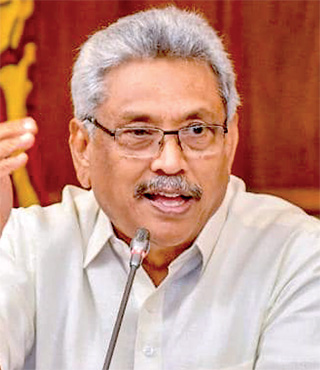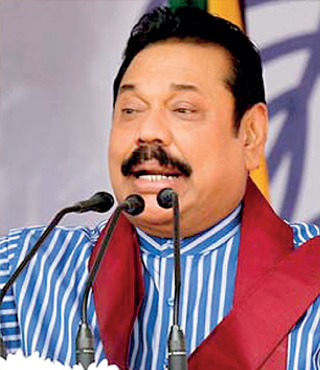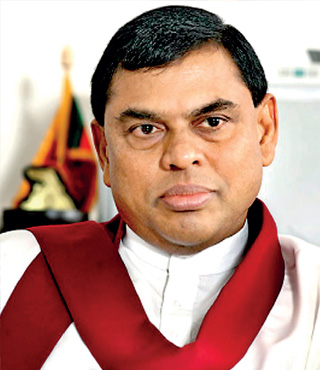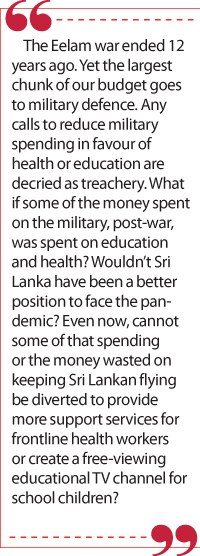Monday Feb 16, 2026
Monday Feb 16, 2026
Wednesday, 1 September 2021 00:10 - - {{hitsCtrl.values.hits}}

President Gotabaya Rajapaksa

Prime Minister Mahinda Rajapaksa

Finance Minister Basil Rajapaksa
“Our Hero who works, loving motherland forever If anyone is protecting the country, that noble man is you”
– Gotabaya Rajapaksa’s presidential campaign theme song –
By Tisaranee Gunasekara
The warnings were clear. Churches will be attacked on Easter Sunday. Authorities turned a deaf ear. The massacre happened. 269 innocent lives were lost.
Three days later Gotabaya Rajapaksa arrived from the US declaring his candidacy. He vowed to protect the good and punish the bad and rode the patriotic horse to a landslide win.
Now he and his family’s Government are being forewarned by a team of medical experts. In the report, Epidemiological and Economic Projections of Mitigation Measures for the COVID-19 Pandemic in Sri Lanka’s Roadmap, the warnings are as specific as those preceding the Easter Sunday massacre. If the lockdown is extended to 18 September, $ 1.67 billion would be lost; but 2,988 lives can be saved. If the lockdown is extended to 2 October, $ 2.2 billion would be lost, but 6,300 lives can be saved.
After the Easter Sunday massacre, Gotabaya Rajapaksa accused the Sirisena-Wickremesinghe administration of de-prioritising national security. “They did not give priority to national security... They were talking about ethnic reconciliation, then they were talking about human rights issues, they were talking about individual freedoms.”
His words fell on a soil made fertile by the blood of innocents. 6.9 million Lankans, the absolute majority of them Sinhalese and Buddhists, voted him into power, choosing safety over ethnic reconciliation, human rights and individual freedoms.
Today the safety of all Lankans is imperilled as never before. If the lockdown is not extended by another month, 6,300 lives will be lost – that is 23.4 times as many as the lives lost in the Easter Sunday massacre. Lankans of every ethnicity and religion, parents and children, spouses and siblings, lovers, relations and friends, 6,300 lives hang in balance. Whether they live or die depends on what the Rajapaksas prioritise – money or lives.
Imagine this. What if an astrologer warns the Rajapaksas that one of them would be among that 6,300 dead? Would they then continue to dither, talking about the economy? Or would they impose the strictest lockdown possible until all danger is over?
A helpful cue might be contained in a letter sent to the staff of the Presidential Secretariat on 11 August by an additional secretary. According to internet reports, the letter limits the staff presence drastically, akin to a semi-lockdown. Two days later, the President rejected calls by medical experts for a national lockdown. His solution was doing PCRs on everyone over 60 suffering from chronic illnesses. Medical experts didn’t respond to that one. They were probably beyond words.
The Rajapaksas may not have read Orwell, but Orwellian thinking seems to be in their very genes. Orwell had Newspeak. The Rajapaksas have Newmath. Last month, the PHI Association wrote a letter to the Government asking why antigen positives are not included in the publicly reported infection numbers. Limiting the infection count to PCR positives has created a massive gulf between ground reality and public perception, the Association warned. In a related development, PCR tests are on the decrease again, down to an average of 15,884 last week, according to a social media post by the Institute for Health Policy.
A similar numbers game is on with mortality figures. COVID-19 deaths are divided into COVID-deaths and deaths with COVID. Only the former, those who have COVID-pneumonia, are included in the publicised death figures. The latter is vaporised out of public sight.
Where Newmath is inadequate, repression kicks in. Dr. Jayaruwan Bandara has been summoned to the CID, soon after questioning the regime’s pandemic response on TV. Incidentally, the CID is also busy with a social activist who, at a media briefing attended by Catholic priests, raised questions about the Easter attacks investigation. Shehan Malaka Gamage has been summoned to the CID five times already. Questioning the questioners seems to be the CID’s new remit.
The Rajapaksas won two elections promising to protect. The question is, who or what are they protecting?
 Pandemic and social unrest
Pandemic and social unrest
August was the cruellest month, so far. In August, 4,395 Lankans died of COVID-19. Amongst them was Susil Sirivardana, a visionary-activist who dedicated his adult life to the battle against poverty.
Ranasinghe Premadasa’s Janasaviya was Sri Lanka’s first and only dedicated poverty alleviation programme. Susil Sirivardana was the man handpicked by President Premadasa to run it. Janasayiya was conceived not as a system of cash handouts but as a programme for economic empowerment.
The original plan consisted of a consumption component, a savings component and an investment component. It was also time-bound. The consumption component was to improve living conditions of recipients for a period of two years. Then the investment component was to be activated enabling recipients to become economic actors by setting up self-employment schemes. The State was to provide advice, training, and where necessary additional financial facilities via bank loans.
This plan had to be scaled down, as the war resumed and financial pressures exacerbated. As Janasaviya Commissioner, Susil Sirivardana struggled relentlessly to implement Janasaviya as a catalyst to empowerment rather than as an augmenter of dependence.
Janasaviya came into being in the socio-political maelstrom created in part by the iniquitous growth of the Jayewardene years. A worse turmoil might be gestating in the womb of the pandemic. A clear warning comes from the IMF in the form of a working paper – Vicious Cycle: How Pandemics Lead to Economic Despair and Social Unrest by Tashin Saadi Sedik and Rui Xu (October 2020). The paper studies 133 countries for the period of 2001-18, against the backdrop of five epidemics – SARS in 2003, HINI in 2009, MERS in 2012, Ebola in 2014, and Zika in 2016 – and conclude that “social unrest increases about 14 months after the pandemic on average”.
In an IMF Staff Paper published in December 2020, the authors reiterate the urgent need for preventive measures. Specific suggestions include improved unemployment and health benefits and cash transfers for those in the informal sector. “We also find that the impact of inequality on social unrest depends on the extent of redistributive transfers. An increase in inequality is associated with more unrest when redistributive transfers are low, suggesting that social safety measures help reduce social tensions.”
Countries with a net Gini over .4 are particularly vulnerable to such upheavals, post-pandemic, they conclude. Sri Lanka belongs in that category and the Rajapaksas, going by their performance, seem uniquely qualified to mishandle matters.
There are no trees in the Middle East but people there have no oxygen issues, proving that there is no connection between oxygen and trees. So said the man the Rajapaksas handpicked to head the Central Environmental Authority.
Similar knowhow seems to be at work shaping Rajapaksa economics. In December 2019, Gotabaya-Mahinda regime denuded the State’s revenue base by slashing taxes even as it recruited tens of thousands of severely under-qualified people into the state sector (to be trained by the military). Revenue shortfall was addressed with ginormous levels of money printing.
When the rupee tanked and foreign reserves dwindled, import bans were imposed without rhyme or reason. Forex-crisis impacted on vaccine-procurement as well. While countries like Bangladesh were placing vaccine orders, Sri Lanka played with Kali and Ritigala concoctions, going so far as to administer these to State employees. We had to wait till the World Bank facility came through in May to start ordering vaccines on a large scale.
In 2020, in the midst of the pandemic, the regime reduced health expenditure in its budgetary allocations. Priority continues to be accorded to physical infrastructure projects, city beautification and other trivia. The best case in point is the insane attempt to build a jogging track on the banks of Parakrama Samudraya. Why a jogging track in the midst of a pandemic? Why in Polonnaruwa? Why on the banks of that ancient tank?
Cognitive dissonance seems to be a hallmark of Rajapaksa economics. In October 2020, the World Bank Chief Economist for South Asia warned that there cannot be a quick rebound of mass tourism in the region, especially in Sri Lanka and Maldives. For tourism to resume, the pandemic must wane. Instead of understanding this reality, the regime stumbles from one irrational scheme to the next to ‘revive’ tourism. The latest includes a buy-one-get-one-free ticketing package by the already indebted SriLankan Airlines.
Another example is the Great Leap Forward towards fully organic agriculture, more an abracadabra trick than a policy measure. The latest twist in that hubristic tale is a plan to import 96,000 metric tonnes of organic fertiliser from China. Quite apart from the quality and the suitability of the product, is this importation even legal?
The acme of this folly and misrule is probably the manner in which the vitally important garment sector is being handled. A collective of trade unions and civic organisations wrote to the Minister of Labour on 24 August, highlighting problem areas within the Free Trade Zones. These include non-sterilised working environments, employees who are first contacts being forced to work alongside other workers, the lack of social distancing during working hours, and the absence of separate quarantine facilities for workers who test positive. Testing is limited and vaccination inadequate. Many workers are paid only half salaries.
If these problems are not addressed, new infection clusters similar to the Brandix cluster might occur, leading another wave of infections. The harder and longer the pandemic hits, the higher its economic costs and greater the possibility of social turmoil.
 From old orthodoxies to a new consensus?
From old orthodoxies to a new consensus?
August was the cruellest month, so far. In August COVID-deaths more than doubled. Amongst them was Mangala Samaraweera.
One could have substantial disagreements with his political choices (as I do), especially his role in breaking up the UNP on the threshold of a life-and-death election for Lankan democracy. But criticisms and reservations are no bar to appreciating his role as an outstanding taboo-breaker in Lankan politics, a fearless slayer of sacred cows. He held a mirror to dark corners and hidden crevices in our polity and society, trying to initiate a conversation on such off-limit subjects as child ordination, clerical child abuse and the paradigmatic difference between the teachings of the Buddha and Sinhala-Buddhism.
Unlike most politicians, his journey was one of progression not regression.
A minister who publicly advised children not to worship politicians had to be a rare animal, an outlier who could have played a key role in any Lankan effort to escape the viral and politico-economic death spiral. Mangala Samaraweera died with his most consequential part in the Lankan drama still unplayed.
The Eelam war ended 12 years ago. Yet the largest chunk of our budget goes to military defence. Any calls to reduce military spending in favour of health or education are decried as treachery.
What if some of the money spent on the military, post-war, was spent on education and health? Wouldn’t Sri Lanka have been a better position to face the pandemic? Even now, cannot some of that spending or the money wasted on keeping Sri Lankan flying be diverted to provide more support services for frontline health workers or create a free-viewing educational TV channel for school children?
When America’s military-industrial complex was birthing, President Eisenhower warned, “Every gun that is made, every warship launched, every rocket fired signifies, in the final sense, a theft from those who hunger and are not fed, those who are cold and are not clothed…” (Presentation to the American Society of Newspaper Editors – 16 April 1953).
Sri Lanka has a military-commercial complex. Sri Lanka might be cash-strapped, but her defence secretary was a high profile participant in Turkey’s International Defence Industry Fair last month. In times of pandemic, the choice is not between guns or butter, but guns or oxygen.
The Washington Consensus is unravelling, and is likely to be replaced by a more progressive agreement, if the recent US-UK-EU backing for a global minimum tax rate is anything to go by. Even the IMF is shifting away from dearly held orthodoxies. Writing in the IMF blog in January 2020, Managing Director Kristalina Georgieva argued for enhanced social spending, funded through a combination of higher taxes on the better off, improved tax collection via digital tools and reduced corruption.
The IMF might have come round to the virtues of progressive taxation. But such radical departures are beyond the Rajapaksas. They will slash taxes to help acolyte businesses and keep a bloated state sector to strengthen their own power. Any discontent will be met not with enhanced social spending but with greater repression.
Hejaaz Hizbullah and Ahnaf Jazeem are still in detention. Lanka e news journalist Keerthi Ratnayake too has been detained under the PTA. Three student leaders had contacted COVID-19 while in quarantine custody. If repression fail, bring out the ethno-religious Other – Tamils and Muslims, Christians too, and international conspiracies that bind all of them. There’s always the Motherland.